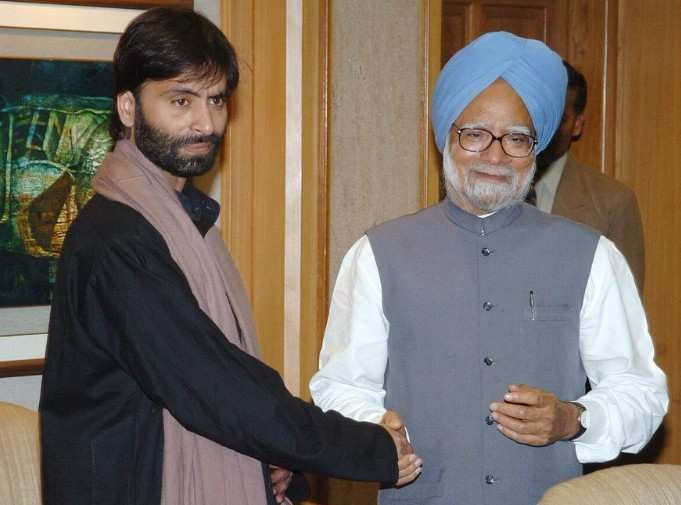Malik’s Explosive Affidavit in Delhi High Court
Jailed Jammu and Kashmir Liberation Front (JKLF) chief Yasin Malik has made startling claims in an affidavit submitted to the Delhi High Court, alleging that former Prime Minister Manmohan Singh personally thanked him after his 2006 meeting with Lashkar-e-Taiba (LeT) founder and 26/11 Mumbai attacks mastermind Hafiz Saeed. Malik, who is serving a life sentence for terror funding, insisted the controversial encounter was not an independent move but an intelligence-driven initiative carried out at the request of Indian officials during a backchannel peace effort with Pakistan.
IB’s Alleged Role in Facilitating Meeting
According to Malik, the initiative began when then Special Director of the Intelligence Bureau (IB), V. K. Joshi, approached him in Delhi shortly before his Pakistan visit in the aftermath of the 2005 Kashmir earthquake. Joshi allegedly urged Malik to not only engage with Pakistan’s political leadership but also reach out to militant figures such as Hafiz Saeed and members of the United Jihad Council. The reasoning, Malik claimed, was that sustainable dialogue with Pakistan would be impossible without including terror leaders in the peace conversation.
Malik stated that he agreed to the proposal and attended a gathering in Pakistan organized by Saeed. At this meeting, Malik said he delivered a speech appealing to jihadist leaders to abandon violence, quoting Islamic teachings that emphasized choosing reconciliation over conflict.
Prime Minister’s Alleged Response
The most explosive element of Malik’s affidavit is his claim about what followed upon his return to India. He asserted that after debriefing with IB officials, he was asked to meet the Prime Minister directly. Malik claimed that during this meeting, held in the presence of then National Security Advisor M. K. Narayanan, Manmohan Singh thanked him for his patience and dedication in engaging with Pakistan’s hardest-line elements.
“When I met the Prime Minister, he conveyed his gratitude and even described me as the father of the non-violent movement in Kashmir,” Malik alleged. He further said that a photograph of his handshake with Singh was later used to portray him as being close to terror groups, which he termed a “betrayal” of the official sanction he had received.
As per media reports:
Terrorist Yasin Malik has said in a sworn affidavit that former Prime Minister Manmohan Singh personally thanked & expressed gratitude to him after he met Lashkar-e-Taiba founder & 26/11 mastermind Hafiz Saeed in Pakistan in 2006
•The meeting was not his… pic.twitter.com/hLgWzCmsVx
— Shehzad Jai Hind (Modi Ka Parivar) (@Shehzad_Ind) September 19, 2025
Political Leaders Allegedly Engaged Malik
In his affidavit, Malik also recounted his interactions with several Indian leaders over the decades. He claimed successive governments — from V. P. Singh and P. V. Narasimha Rao to Atal Bihari Vajpayee and Manmohan Singh — engaged with him as part of efforts to involve Kashmiri separatist voices in the peace process. Malik insisted he was not only provided domestic platforms but was also persuaded to speak internationally about the Kashmir issue.
Repercussions and Controversy
If true, Malik’s statements could raise sharp questions about the methods India’s intelligence agencies and political leadership adopted in engaging Pakistan and separatist leaders. His claim that a sitting Prime Minister expressed gratitude for a meeting with a globally designated terrorist like Hafiz Saeed has the potential to trigger a major political storm. Critics are likely to question whether such backchannel diplomacy compromised national security by legitimizing terror groups.
Malik’s record, however, casts a long shadow over his assertions. He stands accused of orchestrating the 1990 killings of four Indian Air Force officers in Srinagar, the kidnapping of Rubiya Saeed — daughter of then Union Home Minister Mufti Mohammad Sayeed — and is widely blamed by Kashmiri Pandits for the ethnic cleansing and exodus of their community. His role in separatist politics and violent militancy has made him one of the most controversial figures in Kashmir’s recent history.
The Larger Picture
Malik’s affidavit, submitted years into his imprisonment, comes at a sensitive time when India-Pakistan relations remain strained and Kashmiri separatism has lost significant ground. Whether his claims will hold credibility remains uncertain, but the narrative paints a troubling intersection of peace diplomacy, intelligence strategy, and the lingering scars of terrorism. The political fallout is likely to intensify as parties seek to interpret Malik’s words either as evidence of statecraft or as opportunistic distortions by a convicted militant.








